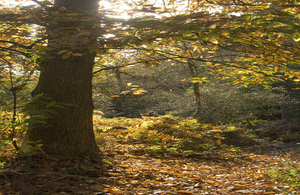Sweet chestnut and plane tree controls introduced
New restrictions on movement of sweet chestnut and plane come into force to protect UK tree species

Sweet chestnut tree
Tighter controls on the import of sweet chestnut and plane trees come into force today throughout England and Scotland as the latest action to guard against tree pests and diseases.
These new regulations, which coincide with the start of the new planting season, mean that movements of plane trees and sweet chestnut trees in, around and out of England will need to be accompanied by official documentation confirming they are from an area free of any relevant disease. This new legislation will help keep the UK free from plane canker and chestnut blight.
In addition, the existing notification scheme for imports of certain tree species from EU member states is being extended to include pine trees. Statutory notification for intra-EU trade will mean that anyone importing pine trees for planting must notify the Food and Environment Research Agency (FERA) in advance of their introduction.
These strengthened requirements were first announced by the Environment Secretary Owen Paterson at the Chelsea Flower Show in May and were supported through consultation at a ministerial summit on tree health in July.
Chief Plant Health Officer Martin Ward said:
These new regulations will help to protect our native tree species and reduce the threats from pests and diseases coming into the country. They will also help us to know exactly how many trees are being imported, and from where, increasing our understanding of the risks involved.
In the longer term, stronger EU requirements are also being pursued for plane and sweet chestnut through protected zone status for the whole of the UK. This will give the UK better protection and will be more compatible with the European single market.
Businesses that import trees, and the people who purchase them, will have additional confidence that any pests or diseases will be detected early on as a result of these new measures.
This is the latest move to protect native trees from the pests and diseases which can be brought into the UK. Following a recommendation from the independent Plant Health Task Force which reported last year, Defra is also developing a plant health risk register which ranks the many different pests and diseases which could be introduced or could spread within the UK.
The register will identify possible priorities for regulation, contingency planning, research, surveys and awareness raising.
Further information on the new legislation